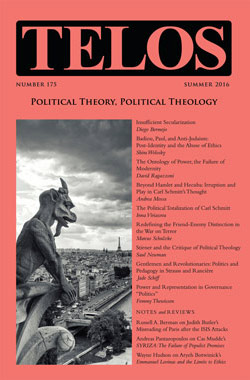When Carl Schmitt declared in Politische Theologie (1922) that “All significant concepts of the modern theory of the state are secularized theological concepts,” one could be forgiven for thinking he was directly invoking Max Stirner, who, in Der Einzige und sein Eigenthum (1845), launched a devastating assault on the religious categories that haunted modern thought and politics. While Schmitt and Stirner are approaching the question from opposed perspectives, they are nevertheless engaged in an investigation of the relationship between theology and politics. This article shows how Stirner’s unmasking of the Christianizing impulse behind modern secular humanism—particularly that of Ludwig Feuerbach—and his critique of liberalism, leads us to a radically atheistic politics in which the sovereignty of the state and its accompanying figure of the liberal individual, are deconstructed. Central here is the notion of the insurrection as a revolt against “fixed ideas” and their hold over us. Through his figures of the unique one, ownness, and insurrection, Stirner provides us with an alternative, non-theological language for subjectivity and politics that avoids the chain of substitutions underpinning the theological drive of modern secularism.
|
|
||||
|
Telos Press Publishing · PO Box 811 · Candor, NY 13743 · Phone: 212-228-6479 Privacy Policy · Data Protection Copyright © 2024 Telos Press Publishing · All Rights Reserved |
||||








